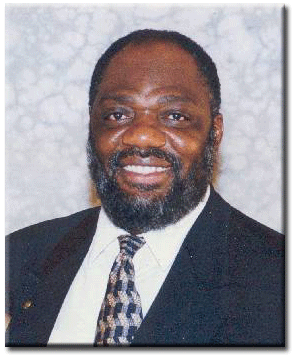
A Constitutional Argument To Hold Elections Later Than October 2003
By Mohamedu F. Jones, Esq
The Perspective
Atlanta, Georgia
 |
|
Cllr. Mohamedu F. Jones
|
At Article 50, Liberia’s Constitution provides in pertinent part, “The President shall be elected by universal adult suffrage of registered voters in the Republic and shall hold office for a term of six years commencing at noon on the third working Monday in January of the year immediately following the elections.” At Article 83(a), The Constitution also provides, “Voting for President, Vice-President, members of the Senate and members of the House of Representatives shall be conducted throughout the Republic on the second Tuesday in October of each election year.” These are two of the Constitution’s Election Timetable Clauses.
The dates required by Articles 50 and 83(a) are determinable, ascertainable and precise. The next elections in Liberia are therefore required to be held on October 14, 2003, and the term of office of the next President is to commence on January 19, 2004. Scheduled elections are premised on the provision of Article 1, which provides: “In order to ensure democratic government which responds to the wishes of the governed, the people shall have the right at such period, and in such manner as provided for under this Constitution, to cause their public servants to leave office and to fill vacancies by regular elections and appointments.”
On its face, it would appear that any departure from the dates certain of the Election Timetable Clauses would be in violation of the Constitution. This could be said to be the case if one looks at Article 50 and 83(a) solely in relation to the Election Timetable Clauses, in isolation of other constitutional provisions, out of context of the whole text of the Articles, and without taking into consideration the interrelated-real-world conditions existing in Liberia. Indeed, the Liberian Constitution itself offers the rationale and reasoning to support holding elections in Liberia on a date other (and necessarily later) than October 14, 2003 to afford full compliance with the entire Constitution.
On closer examination of Article 85(a), we find that in addition to requiring elections to be held on “on the second Tuesday in October of each election year,” it also states specifically that elections “shall be conducted throughout the Republic.” Neither the Election Timetable Clause of Article 85(a) nor the requirement that elections are to be conducted throughout the Republic (the “Elections Coverage Clause”) is of lesser constitutional significance than the other. They are both equally significant and interwoven. Therefore, this means that any elections held on October 14, 2003, that is not conducted in the entire country would be out of compliance with the Elections Coverage Clause of Article 85(a).
In addition, Article 48 provides in part, “The House of Representatives shall be composed of members elected for a term of six years by the registered voters in each of the legislative constituencies of the counties…” (the “Legislative Constituency Clause”). Further, Article 80(c) states: “Every Liberian citizen shall have the right to be registered in a constituency, and to vote in public elections only in the constituency, and to vote in public elections only in the constituency where registered, either in person or by absentee ballot” (the Constituency Registration and Voting Clause) Under the provisions of these clauses, members of the House are required to be elected by registered voters in each of the legislative constituencies of the several counties. Any elections in which eligible citizens in each constituency are not able to register to vote to elect members of the House would be out of compliance with Article 48 and Article 80(c).
Also, elections conducted under conditions where the Supremacy Clause (Article 2) is inapplicable to more than 60 percent of the country cannot reasonably be said to be constitutional. Another related fundamental premise on which both the Elections Coverage Clause and the Election Timetable Clauses are based might be found in Article 3, which states unequivocally that Liberia is a “unitary sovereign state.” The Constitution simply does not contemplate circumstances where the writ of government’s authority does not extend to the entire country, as is the case presently.
Under Article 77, “every Liberian citizen not less than 18 years of age, shall have the right to be registered as a voter and to vote in public elections and referenda under this Constitution” (the Voters’ Registration Clause). Significant numbers of Liberia’s citizens (in Lofa, Cape Mount, Grand Gedeh, Sinoe, Bomi, Bong and other parts of the country) would be denied their Article 77 rights if elections were conducted in October 2003 under prevailing conditions in the country. Moreover, their Article 26 rights would also be denied under the circumstances. Article 26 provides in part: “Where any person or any association alleges that any of the rights granted under this Constitution or any legislation or directives are constitutionally contravened, that person or association may invoke the privilege and benefit of court direction, order or writ, including a judgment of unconstitutionality…” (the Right to Redress Clause).
If elections are held in Liberia in October 2003 under prevailing conditions, such elections would be in compliance with the important, but not insurmountable Election Timetable Clauses (Articles 50 and 83(a) of the Constitution, but, however, would be conducted out of compliance with the Supremacy Clause (Article 2); the Elections Coverage Clause (Article 83(a); the Legislative Constituency Clause (Article 48); the Constituency Registration and Voting Clause (Article 80(c); the Voters Registration Clause (Article 77); and the Right to Redress Clause (Article 26), all of which are fundamental and essential provisions of the same Constitution. A political resolution such as what has been proffered by Archbishop Michael Francis is clearly necessary to achieve constitutionally sanctioned elections in Liberia.
